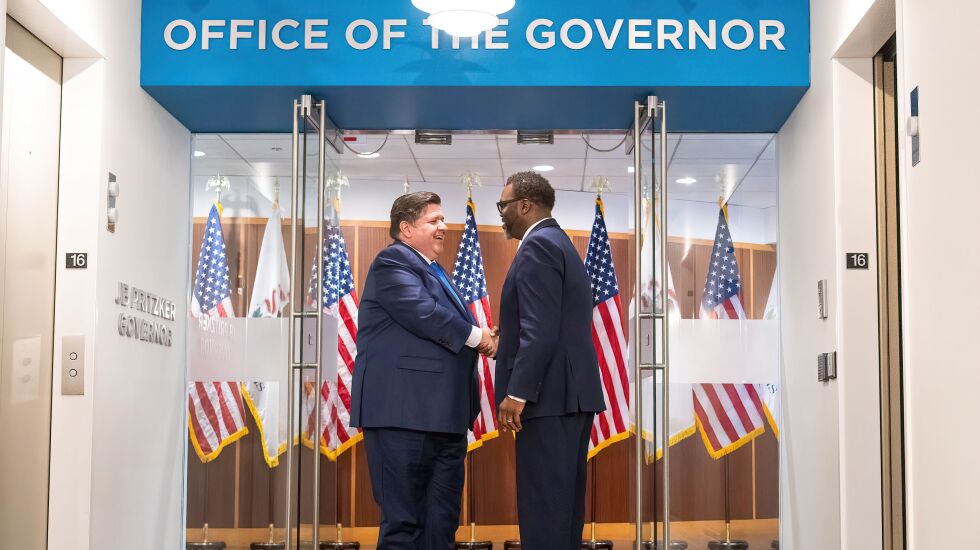
Mayor-elect Brandon Johnson and Gov. J.B. Pritzker emerged from their first face-to-face meeting since the election on Friday with warm words for one another and what each brings to his job.
But the two did not talk about one of Johnson’s key proposals, his $800 million tax plan to benefit public safety, which includes at least one idea the governor has vocally opposed.
The meeting in Pritzker’s Chicago office came a day after Johnson met with Mayor Lori Lightfoot for 90 minutes, as the two ditched campaign chatter and instead focused on “making sure the city is united.”
Pritzker told reporters he and the newly elected mayor spoke behind closed doors about growing the city’s economy, job creation, entrepreneurship, small businesses and “making sure that we’re creating an avenue for success for everybody in our city.”
Johnson said he is “very much impressed by the governor’s compassion and love” when it comes to investing in neighborhoods.
“And it’s great to have a real partner to not only rebuild our city but to make sure that individuals who wish to be small business owners and larger corporations can actually have a city that works and an entire body of government at every single level that’s willing to work together,” Johnson said.

On the campaign trail, Johnson proposed an $800 million tax plan to help bankroll an array of new social programs that are part of his anti-violence strategy, with many portions of that plan needing approval by the City Council and Illinois General Assembly.
Johnson nixed a “Metra city surcharge” to raise $40 million “from the suburbs.” But as of the final weeks of his campaign, his plan still included taxes on high-end home sales and financial transactions; a revived employee head tax; increased taxes on jet fuel and hotel rooms; and “new user fees for high-end commercial districts frequented by the wealthy, suburbanites, tourists and business travelers.
Pritzker said the two did not discuss the tax plan during their meeting on Friday. But he acknowledged he does not support a financial transaction tax.

“Obviously, what we all want is a thriving financial services economy in the state and the city, and it’s been that way. And I have not stood for a transaction tax because I think it would be easy for those companies and servers to move out of the state,” Pritzker said.
“But, you know, I do know that the challenge of finding balance between expenditures and revenue is, you know, not lost on me. I came into a difficult situation and I think, I know the mayor-elect similarly wants very much to serve the people of Chicago properly and balance the budget at the same time.”
Johnson, asked if he wants the Illinois General Assembly to pass a real estate transfer tax, acknowledged he did not get into the weeds of the city’s budget plan with Pritzker.

“The reliance on property taxes have left a lot of families in economic turmoil or despair,” Johnson said. “But we also recognize that the governor and I are committed to investing in communities that need it.”
Johnson said he is “very much committed to working with the General Assembly and the office of the governor to ensure that those critical investments take place.”
The two also discussed investing state funds in programs designed to reduce crime, said Jordan Abudayyeh, the governor’s spokeswoman.
Pritzker had a frosty relationship with Lightfoot — and actively distanced himself from her politically as she campaigned for re-election. But he also steered clear of endorsing Johnson in the runoff election despite his progressive credentials, as the governor continues to focus on his own political future and helping Chicago land the 2024 Democratic National Convention.

But Pritzker on Friday said Johnson’s victory enhances the city’s chances of nabbing the coveted convention.
Johnson was painted as a progressive darling in national headlines during the runoff campaign. And his victory suggested a different path, more liberal approach, when it comes to the leadership of Democratic cities, in stark contrast to New York City, where the more moderate choice, Mayor Eric Adams and his “tough-on-crime” message, prevailed.
“He brings a real excitement to the job, I think to the people of Chicago,” Pritzker said of Johnson. “And I think that’s being felt in Washington, D.C.”








